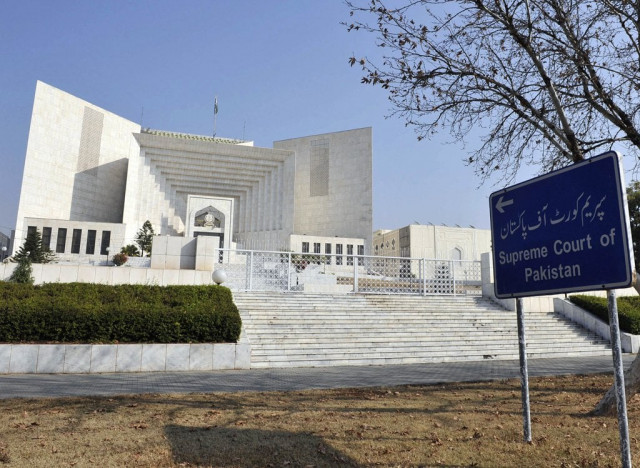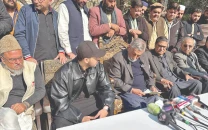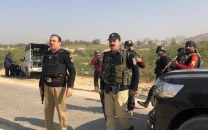SC converts death sentences to prison terms in 2010 Sialkot case
‘Vendetta cannot equate itself with justice’, says apex court in judgment on mob murders

The Supreme Court of Pakistan. PHOTO: AFP/FILE
“Vendetta cannot equate itself with justice. It is devoid of solemnity inherent in the process of law, leaving an offender as a victim, an object of sympathy at the end of the day, without judicial certainty about his guilt; therefore, the appellants cannot be allowed to go scot free without a tag”, says a seven-page written ruling authored by Justice Qazi Muhammad Amin Ahmed.
The other members of the bench were Chief Justice of Pakistan Asif Saeed Khosa and Justice Mazhar Alam Miankhel.
The bench has converted the death sentences of seven accused to ten years’ imprisonment in the case involving the murder of two brothers by a mob in Sialkot in 2010.
ATC issues arrest warrants for absconding accused
The court noted that convictions and sentences recorded by a trial court and upheld by the high court require serious reconsideration in the facts and circumstances of the case, and that the peculiarity of the situation in which the incident occurred reasonably suggested that the first part of the occurrence triggered the outrage and instantly swayed the appellants’ faculties who otherwise had no motive or axe to grind.
“It is this spontaneity wherein the appellants (convicts) resorted to violence, seemingly without premeditation and choice weapons and thus consequences of their transgression, which more aptly falls within clause (c) of Section 302 of the Pakistan Penal Code, 1860, a statutory substitute for the erstwhile Section 304 of the Code as held by this court in around one dozen cases.
The order also notes that the accused in the most heinous and gruesome offences is entitled to the right to a fair trial by a tribunal designated by law with a meaningful opportunity to vindicate and defend his position both before the prosecuting authority as well as the court.
“Collective human wisdom, since time immemorial, has not been able to evolve a better or more humane procedure to prosecute and convict offenders than the due process of law, with procedural safeguards under the Constitutional guarantee of fair trial, to hand down sentences mandated there under on the preponderance of legal evidence, without compromising on the principle of inherent human dignity”, says the order.
Convicted naval officers told to file review petition
Facts of case
Ali Raza alias Peter, Muhammad Shafique, Rashid, Muhammad Iqbal alias Ballu, Jamil Jeela, Muhammad Amin, Muhammad Shafique alias Foji, Muhammad Waris, Ateeb alias Nosha, Hassan Raza, Asghar Ali, Jamshaid alias Sheeda, and Sarfaraz Ahmad, appellants in the case, are in receipt of a guilty verdict, returned by the learned Special Judge, Anti Terrorism Court-1, Gujranwala; they had been indicted alongside fifteen others, since acquitted, for lynching Muneeb Sajjad and Mughees Sajjad, real brothers, on August 15, 2010 within the precincts of the Saddar Police Station in Sialkot.
Of competing accounts, the first was put forth by Shoukat Ali vide FIR No.437 and recorded at 7:05 a.m. wherein the deceased were portrayed as robbers who, upon resistance, had fatally shot Zeeshan and Bilal, with Muhammad Javed and Muhammad Imran surviving the assault.
It is alleged that, attracted to the scene, the neighbourhood subdued the robbers who could not endure the outrage of the mob. Police secured two .30 caliber pistols with ten live bullets alongside snatched articles.
SC abandons idea of reconstituting Isa bench
Forensic reports subsequently confirmed the homicidal deaths of Zeeshan and Bilal as well as injuries to Muhammad Imran and Muhammad Javed, caused by gunshots and multiple blunt weapon injuries, leading to the deaths of Muneeb Sajjad and Mughees Sajjad. Their deaths foreclosed the case registered against them by Shoukat Ali. Upon cognizance by the Supreme Court, a new FIR was recorded on August 20, 2010. It was alleged that both the deceased used to play cricket at a ground located in the Buttar village and had a brawl with the locals a few days back. It is in this backdrop that, on the fateful day on which both of them left home after Fajr prayer on a motorbike, a mob comprising, amongst others, the appellants (convicts) tortured them to death and attempted to hush up the crime by projecting them as robbers within the view of police officials who, by that time, had arrived on the scene; the second FIR conspicuously omits the details regarding the first two deceased and the injured.
Reasoning
The court notes that what is established beyond doubt in the first crime report is massive violence suffered by four individuals, though with a reticent reference to the robbers, two in number, without the details and identities of those who had lynched them shortly thereafter.
It is also noted that the prosecution’s complete silence on deaths and injuries as well as details collateral therewith occurring within same time and space, in the second FIR as well as during the trial, is most intriguing. Similarly, the deceaseds’ armed detour for a morning motorbike stint, with undigested food in their stomachs, to be confronted by a mob, is a story that may not find a buyer, says the order.
The court said that, in the absence of the whole truth, “the Court must not be deterred by the incompleteness of the tale from drawing the inferences that properly flow from the evidence and circumstances”.
The order says that available evidence on the record does not allow any hypothesis that suggests anyone else being responsible for the first incident other than the deceased of the present case, who had subsequently fallen prey to a mob’s wrath with the appellants being at the helm.
“The defence’s objection on the admission of forensic evidence establishing appellants’ identity as well as participation in the crime does not hold much water. Technological innovations have opened up new avenues of proof to drive home charges. Article 164 of the Order invests the Court with wide powers to make use of evidence generated by modern devices and techniques; Articles 46-A and 78-A of the Order as well as provisions of Electronic Transactions Ordinance (LI of 2002) have smoothened the procedure to receive such evidence, subject to restrictions/limitations provided therein.
The judgment says that the court has undertaken an exhaustive survey of jurisprudence on the subject in the recent case of Judge Arshad Malik which had authoritatively settled the parameters to receive forensic evidence through modern devices.
“In the totality of circumstances, the evidence could not possibly have been manipulated and thus constitutes a piece of evidence too formidable to be shaken through bald assertions alone. Therefore, we entertain no manner of doubt that the appellants are responsible for what befell the deceased and the appellants thus cannot be exonerated for their recourse to violence upon the deceased. The prosecution of offences, to the exclusion of all others, is a state prerogative and sentencing the offenders is a judicial province”, says the order.
Renowned lawyers Zahid Bukhari and Ahsan Bhoon appeared on behalf of the appellants before the apex court.



















COMMENTS
Comments are moderated and generally will be posted if they are on-topic and not abusive.
For more information, please see our Comments FAQ